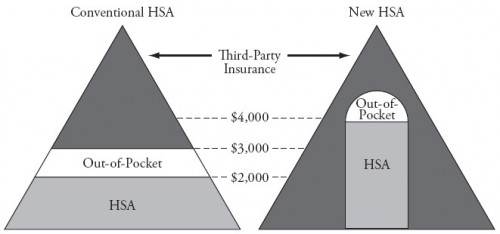1. I found these two sentences from Chapter 11 of John Goodman’s book Priceless puzzling:
We could spend our entire gross domestic product on healthcare in useful ways. In fact, we could probably spend the entire GDP on diagnostic tests alone—without ever treating a real disease.
How is that useful to the consumer? Maybe John is only thinking of the device manufacturers’ welfare.
2. No argument with this:
[M]edical science offers varying evidence on how frequent such [cancer diagnostic] exams should be, making this a subject of continuing controversy. That means that decisions about diagnostic tests often reflect a personal value judgment, and people’s values differ. In general, when a test is not prompted by a risky event or some other indication, it should be a matter of individual preference.
But insurers do need to decide what they will cover, and consumers, as well as their physicians, will want to know what medical science says about the tests even when the results aren’t decisive.
3. John clarifies the role of value-based insurance design. What he writes about vaccinations applies more generally.
Take immunization for childhood diseases. Studies show that these procedures pay for themselves by avoiding future healthcare costs that are greater than the costs of the vaccinations. This implies that members of an insurance pool have an economic self-interest in seeing that all children covered by the pool are vaccinated. It may make economic sense for the pool to pay for vaccinations, thereby incurring more cost than self-pay would generate, or to require that members obtain them, thereby reducing autonomy.
John has a nice figure to illustrate. In the “new HSA” there would be first dollar coverage from third-party insurance for high-value services the insurer wishes to promote.
4. Another good idea is reference pricing:
Suppose a patient is diagnosed with cancer, and the health plan normally would contract to pay a fixed fee to a medical facility to cover all costs. If the plan could be assured that this fixed fee were its maximum exposure, the plan would have no economic interest in restricting the patient’s choices. It could, for example, allow the patient to go to an alternative provider and pay more, if needed, out of pocket or from an HSA. In this way, the plan controls its costs, and patients still exercise choice; the exercise of choice puts pressure on the plan to maintain quality in its own preferred medical facility.
5. A main concern about consumer-directedness is the snake-oil problem.
One spectacular success story is Dr. Bernard Salick, a kidney specialist who has become a millionaire by pioneering a national chain of round-the-clock cancer clinics.
I have no problem with Dr. Salick or anyone else becoming a millionaire provided that reflects the value he has provided to society. (And I am not suggesting that Dr. Salick has not provided full value for his wealth, though, to be honest, I have no idea.) That this necessarily would be so is unclear in a market that is not comprised of well-informed consumers. Health literacy is a real problem. You can test this at home. Go to Choosing Wisely. Pick a specialty. Read which procedures that are not recommended and why. If you don’t or couldn’t understand what is written there, how would you know to reject what an unscrupulous provider might offer to do for you for access to your wallet? What’s to prevent a Dr. Salick from making his fortune at your expense, conferring little or nothing of actual health value?
I know what some readers are thinking: this type of thing sorts itself out in other markets. That’s largely true, though some people do get scammed some of the time, perhaps many more of us than we realize. Also, small problems in other markets are not as big a deal. You won’t physically suffer from mistakenly buying fabric softener that does nothing. You really could if you buy a useless or even dangerous medical product or service.
All other posts on Priceless are here. Sunday’s post will cover Chapters 12-14.



